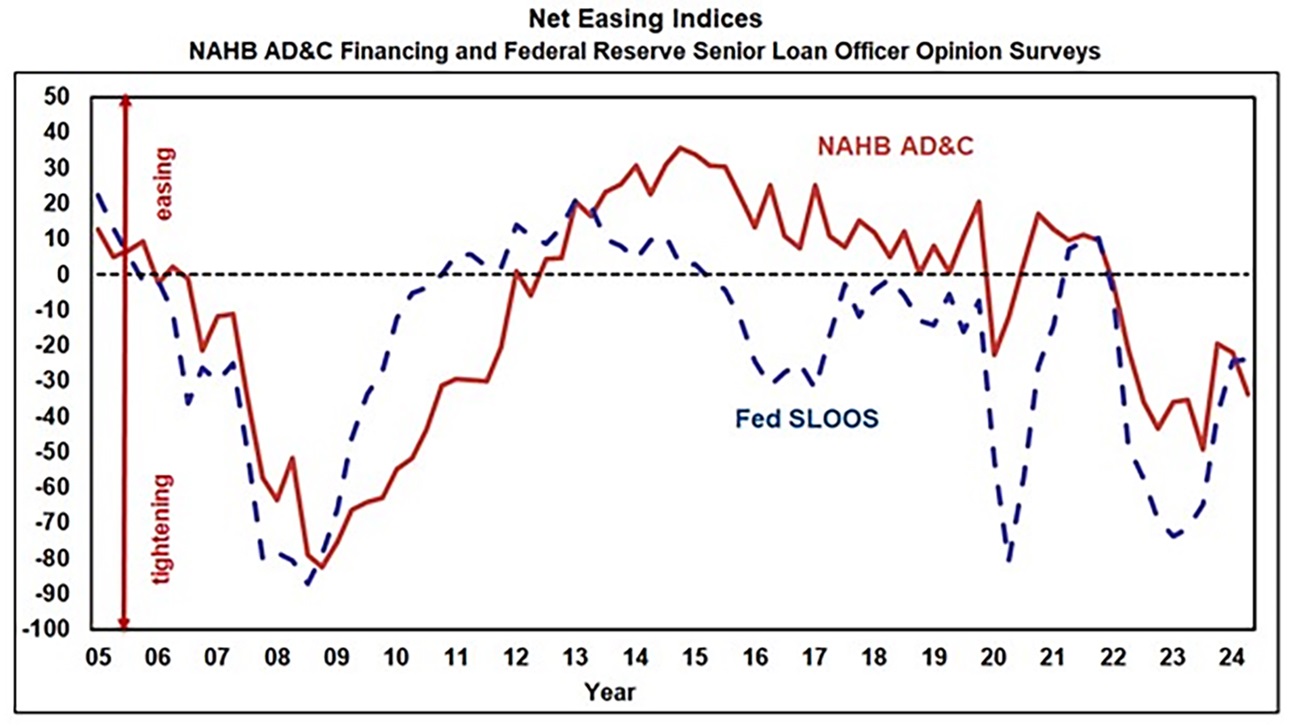Tightened Credit for Builders in Q2

During the second quarter of 2024, credit for residential Land Acquisition, Development & Construction (AD&C) continued to tighten and became even more expensive for most types of loans, according to NAHB’s survey on AD&C Financing. The survey was conducted in July and asked specifically about financing conditions in the second quarter, predating the release of some relatively weak economic data that has raised prospects for monetary policy easing.
The net easing index derived from the survey posted a reading of -33.7 in the second quarter. (The negative number indicates that credit was tighter than in the previous quarter.) The comparable net easing index based on the Federal Reserve’s survey of senior loan officers posted a similar result, with a reading of -23.8 — marking the 10th consecutive quarter of borrowers and lenders both reporting tightening credit conditions.
According to the NAHB survey, the majority (85%) of respondents noted that lenders were tightening in the second quarter by:
- Reducing the amount they are willing to lend, and
- Lowering the loan-to-value (or loan-to-cost) ratio.
Half of respondents also reported tightening by increasing documentation, increasing the interest rate, and requiring personal guarantees or other collateral unrelated to the project.
As credit becomes less available, it also tends to become more expensive. In the second quarter, the contract interest rate increased on all four categories of AD&C loans tracked in the NAHB survey:
- 8.40% in 2024 Q1 to 9.28% on loans for land acquisition,
- 8.07% to 9.05% on loans for land development,
- 8.24% to 8.98% on loans for speculative single-family construction, and
- 8.38% to 8.55% on loans for pre-sold single-family construction.
Paul Emrath, NAHB vice president for survey and housing policy, provides further insights in this Eye on Housing post.
Latest from NAHBNow
Mar 05, 2026
Affordability Posts Mild Gains in Second Half of 2025 but Crisis ContinuesThough new and existing homes remain largely unaffordable, the needle moved slightly in the right direction in the second half of 2025, according to the latest data from the NAHB/Wells Fargo Cost of Housing Index (CHI). The CHI results from the fourth quarter of 2025 show that a family earning the nation’s median income of $104,200 needed 34% of its income to cover the mortgage payment on a median-priced new home. Low-income families, defined as those earning only 50% of median income, would have to spend 67% of their earnings to pay for the same new home.
Mar 04, 2026
Top Markets for Remodeling in 2024Residential improvement activity remained solid in 2024, supported by an aging housing stock, elevated homeowner equity, and a growing need for aging-in-place improvements. Based on NAHB analysis of data from home improvement loan applications, see which markets saw the most remodeling activity.
Latest Economic News
Mar 03, 2026
Multifamily Absorption Rate Remains Below 50%The percentage of new apartment units that were absorbed within three months after completion was unchanged for new units completed in the second quarter, according to the Census Bureau’s latest release of the Survey of Market Absorption of New Multifamily Units (SOMA).
Mar 02, 2026
Private Residential Construction Spending Edges Higher in DecemberPrivate residential construction spending was up 1.5% for the last month of 2025. This modest gain was driven primarily by increased spending on home improvements and single-family construction. Despite this increase, total spending remained 1.3% lower than a year ago, reflecting the continued impact of housing affordability challenges facing the sector.
Mar 02, 2026
2024 Home Improvement Loan Applications: A State- and County-Level AnalysisResidential improvement activity remained solid in 2024, though growth has moderated from the surge seen in 2022.
